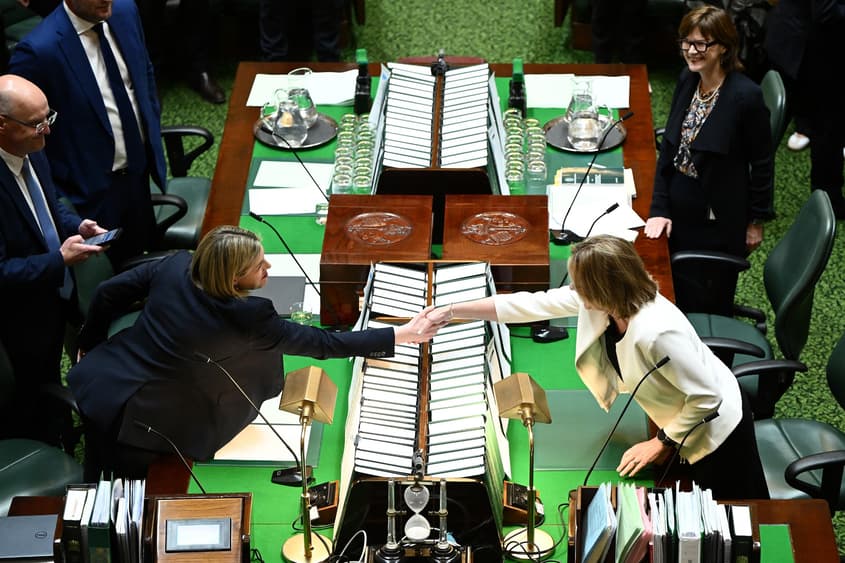We're one year out from the Victorian state election - policies to strengthen the state's democracy could define next year’s election.
Fri 28 Nov 2025 06.00

Victorian Opposition Leader Jess Wilson (left) shakes hands with Victorian Premier Jacinta Allan | Photo: AAP Image/Joel Carrett
Victoria’s next election is about one year away.
The Labor Government has been criticised on issues like a “creeping politicisation” of the public service and “stonewalling” anti-corruption officials.
With the Liberal opposition dealing with its own governance issues, policies to strengthen Victoria’s democracy could define next year’s state election.
Here are five proven policies, endorsed by integrity experts or multi-party committees, that would improve open government and accountability in Victoria.
In Victoria, it’s perfectly legal to lie in a political ad – but in 2022, it looked as though that was going to change. The Labor Government, Liberal Opposition Leader Matthew Guy and Victorian Greens all announced their support for truth in political advertising reform, modelled on South Australian laws that have worked for forty years.
But after Guy lost the leadership, the Labor Government did not press the issue. Three years later, Victorians are still waiting.
Truth in political advertising laws are known to work, they enjoy multi-party support and could improve the truthfulness and tenor of elections.
Victoria’s integrity watchdog is called the Independent Broad-based Corruption Commission (IBAC). With “broad-based” in the name, you might assume it has a wide remit – but its powers are limited compared to peers like the NSW Independent Commission Against Corruption.
Former head Robert Redlich outlined reforms to strengthen IBAC, including allowing more public hearings and widening the definition of corruption to include non-criminal corruption. “Soft” corruption can include things like nepotism, branch-stacking, “pork-barrelling” and cronyism.
The Liberal–National Coalition and Greens tried in 2023 to strengthen the IBAC in response to earlier warnings from Redlich, but Labor voted the reforms down.
Integrity agencies are responsible for holding the government of the day to account, but their budgets are controlled by that same government.
For years, Victoria’s IBAC, Ombudsman and Auditor-General’s Office have called for their budgets to be set by Parliament, to protect them from pressure and retaliation.
The Victorian Ombudsman has had to cancel and scale-back projects because of a $1.4 million funding shortfall.
Having Parliament set budgets would ensure integrity agencies have the funds and resources they need and mean their critiques of government come without fear of reprisal.
Elected representatives in Parliament use orders for documents to make the Government publish information, potentially revealing maladministration, bad behaviour and information relevant to the public.
However, there is little recourse when the Government claims “privileged” information must not be released. Since Parliament never sees the documents, there is no way to test the Government’s claims. In NSW, this problem is resolved by an independent arbiter.
In the wake of allegations of child sex abuse in childcare centres, parliamentarians in both NSW and Victoria sought information about childcare breaches. But whereas the NSW Government handed over the information, the Victorian Government failed to meet the deadline. The NSW information contributes to a harrowing but important Four Corners investigation.
If political parties committed to the NSW arbitration system, Victorians would enjoy the same open government as their northern neighbours.
Victoria’s electoral laws favour major parties and incumbents, who receive generous taxpayer funding and enjoy loopholes to the strict donation caps that apply to political candidates.
The effect is that contributions from small groups or special interests, like MPs and their staff (for Labor) or the right-wing Cormack Foundation (for the Liberals), far outweigh the financial contribution from the remaining 4.8 million Victorian voters.
If Victorian politicians committed to the nine principles for fair political finance reform, Victoria could have a more democratic electoral system where every candidate faces a level playing field.
There have been some welcome integrity improvements during this term. Labor agreed to make the chair of the Integrity and Oversight Committee a non-government member, after serious concerns about Labor’s attitude to the outgoing IBAC Commissioner. A Greens amendment has put an end to “dump day”, where “the Government releases a flood of annual reports all at once, making it nearly impossible … to properly scrutinise them.”
This gives hope that other integrity reforms, like secure funding for integrity agencies and a fairer playing field for elections, are within reach of the Victorian Parliament in its next term.
